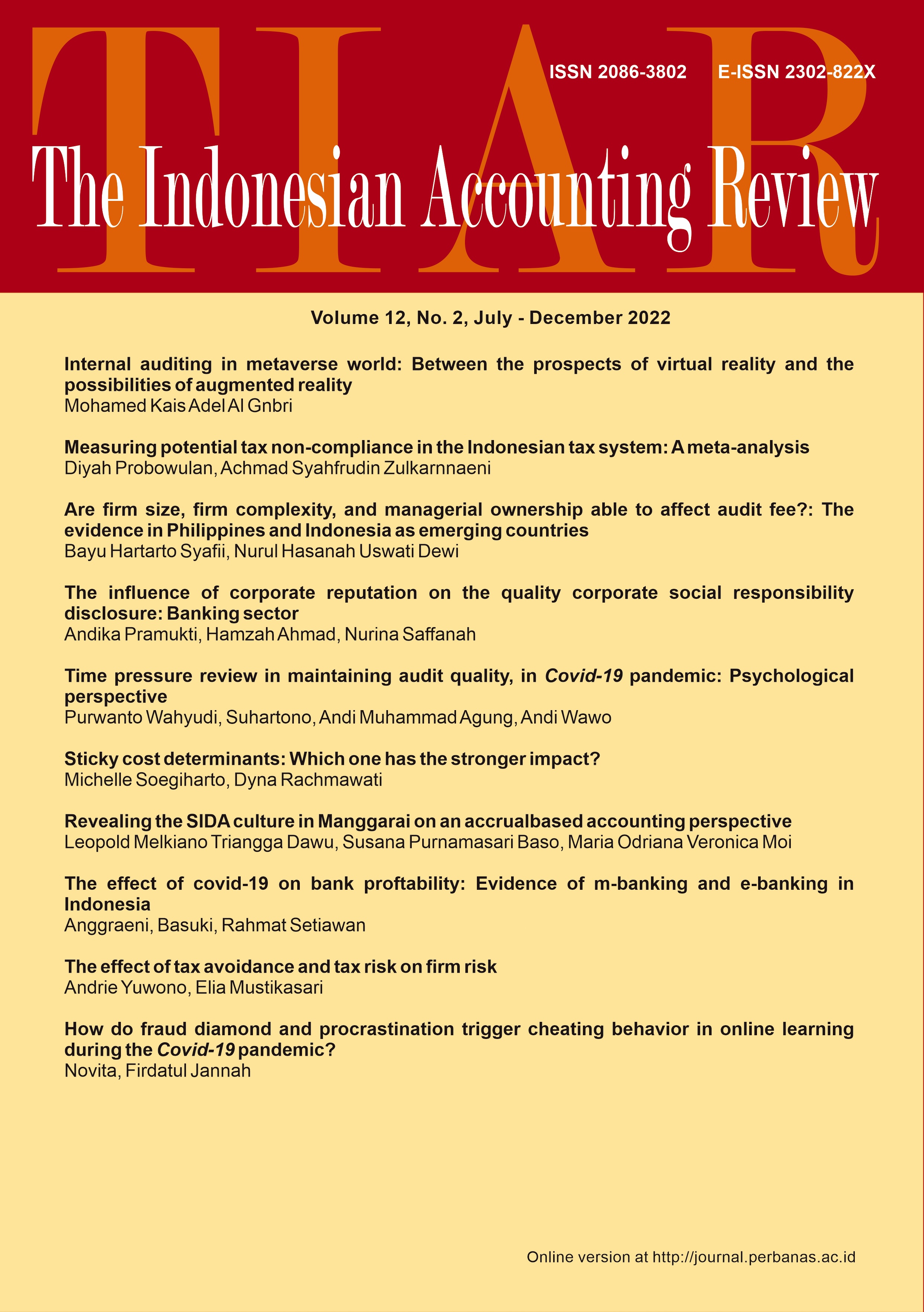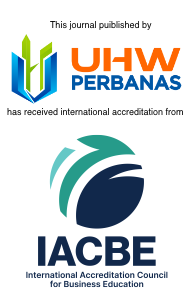Measuring potential tax non-compliance in the Indonesian tax system: A meta-analysis
DOI:
https://doi.org/10.14414/tiar.v12i2.2821Keywords:
Tax non-compliance, Tax system, Tax avoidance, Tax evasion, Meta-analysis.Abstract
This study aims to assess, firstly, the potential for taxpayers' non-compliance from previous studies that are dominant between tax avoidance and tax evasion due to active resistance in the taxation system in Indonesia. Secondly, it also tries to assess and parse the ability of the taxation system in Indonesia to prevent taxpayers from being disobedient. This study used a meta-analysis for the data analysis with the moderating variable regression equation of the taxation system. The results show that high tax sanctions and stable financial conditions can minimize the potential for tax non-compliance, while the quality of tax services, compliance costs, and tax socialization from 12 study samples have not been able to be used as factors to reduce the potential for tax non-compliance. This study also identifies the tendency of tax non-compliance behavior to be dominated by tax evasion. The originality of this study lies in using the meta-analysis method and using a dummy on the dependent variable to see the potential for non-compliance between tax avoidance and tax evasion. The implications of this study provide important insights for policymakers and government leaders in designing fiscal policies to minimize the social phenomena of tax non-compliance and build a tax compliance mindset and also redesign a tax system that is more credible, easy to understand, and prevents loopholes a system that the taxpayer can utilize.
References
Ajzen, Icek. 2009. “Constructing a TpB Questionnaire: Conceptual and Methodological Considerations.†In Brief Description of the Theory of Planned Behavior, 49:1335–74. https://doi.org/10.1002/hep.22759.
Akram, Muhammad, Muhammad Ilyas, and Hassan Mobeen Alam. 2017. “An Investigation of Ways of Tax Non- Compliance : The Case of Small Business Sector in Pakistan.†Journal of the Research Society of Pakistan 2 (54): 199–209. http://pu.edu.pk/images/journal/history/PDF-FILES/14-Paper_54_2_17.pdf.
Alabede, James O., Zaimah Bt Zainol Affrin, and Kamil Md Idris. 2011. “Tax Service Quality and Compliance Behaviour in Nigeria: Do Taxpayer’s Financial Condition and Risk Preference Play Any Moderating Role?†European Journal of Economics, Finance and Administrative Sciences 3 (35): 90–108.
Amponsah, Stephen, Zangina Isshaq, and Daniel Agyapong. 2019. “Determinants of Tax Stamp Evasion in Rural Districts in Ghana: A Case of Twifu Atti-Morkwa and Hemang Lower Denkyira Districts.†International Journal of Law and Management 61 (1): 73–90. https://doi.org/10.1108/IJLMA-08-2017-0190.
Appah, Ebimobowei, et al. 2016. “Tax Compliance Intentions and the Behaviour of the Individual Taxpayer: Evidence from Nigeria.†Research Journal of Finance and AccountingOnline) 7 (13): 2222–2847. https://core.ac.uk/download/pdf/234631488.pdf.
Balaj, D, and T Mulaku-Balaj. 2016. “Establishment and Development of Tax System-Disadvantages and Advantages of Taxes. The Case of Kosovo.†Journal of Advanced Studies in Finance 2 (14): 117–29. https://doi.org/10.14505/jasf.v7.2(14).03.Article.
Blackburn, Keith, Niloy Bose, and Salvatore Capasso. 2012. “Tax Evasion, the Underground Economy and Financial Development.†Journal of Economic Behavior and Organization 83 (2): 243–53. https://doi.org/10.1016/j.jebo.2012.05.019.
Blackwell, Calvin. 2014. “A Meta-Analysis of Tax Compliance Experiments.†Andrew Young School of Policy Studies Annual Conference on Public Finance Issues Tax, no. May: 4–19. https://icepp.gsu.edu/files/2015/03/ispwp0724.pdf.
Bobrova, Anna Vladimirovna, Evgeny Aleksandrovich Stepanov, and Ilya Alekseevich Tetin. 2017. “Development of Methods of Optimization of Non-Tax Payments for Decrease in Expenses of the Company at Implementation of the Foreign Economic and Resource Activity. Optimization of Non-Tax Payments.†Journal of Advanced Research in Law and Economics 8 (6): 1711–26. https://doi.org/10.14505/jarle.v8.6(28).06.
Borenstein, Michael, Larry V Hedges, and Hannah R Rothstein. 2009. “Introduction to Meta-Analysis.†In Introduction to Meta-Analysis, First Publ, 13–14. West Sussex: A John Wiley and Sons, Ltd., Publication.
Chan, K. Hung, K. Z. Lin Kenny Z., and Phyllis L.L. Mo. 2010. “Will a Departure from Tax-Based Accounting Encourage Tax Noncompliance? Archival Evidence from a Transition Economy.†Journal of Accounting and Economics 50 (1): 58–73. https://doi.org/10.1016/j.jacceco.2010.02.001.
Coolidge, Jacqueline. 2012. “Findings of Tax Compliance Cost Surveys in Developing Countries.†EJournal of Tax Research 10 (2): 250–87. https://www.scopus.com/inward/record.uri?eid=2-s2.0-84893704546&partnerID=40&md5=79bac633b1b664c92bc5180da8bdfa2e.
Dularif, Muh, T. Sutrisno, Nurkholis, and Erwin Saraswati. 2019. “Is Deterrence Approach Effective in Combating Tax Evasion? A Meta-Analysis.†Problems and Perspectives in Management 17 (2): 93–113. https://doi.org/10.21511/ppm.17(2).2019.07.
Elvik, Rune. 2018. “Meta-Analytic Methods.†Transport and Sustainability 11: 425–47. https://doi.org/10.1108/S2044-994120180000011022.
Fikes & Taylor. 2002. “Attribution Theory – a Theoretical Perspective.†In Universiteit Van Pretoria, 37–58.
Fjeldstad, Odd-helge. 2013. “Taxation and Development A Review of Donor Support to Strengthen Tax Systems in Developing Countries.†In WIDER Working Paper No., 1–28. https://doi.org/http://hdl.handle.net/10419/80886.
Franzoni, Luigi Alberto. 1999. “Tax Evasion and Tax Compliance.†University of Bologna, Italy, no. 1998: 52–94.
Gallagher, Mark. 2005. “Benchmarking Tax Systems.†Public Administration and Development 25 (2): 125–44. https://doi.org/10.1002/pad.353.
Gamannossi degl’Innocenti, Duccio, and Matthew D. Rablen. 2020. “Tax Evasion on a Social Network.†Journal of Economic Behavior and Organization 169: 79–91. https://doi.org/10.1016/j.jebo.2019.11.001.
Ghani, Hazman, Nadiah Abd Hamid, Soliha Sanusi, Roszilah Shamsuddin, and Corresponding Author. 2020. “The Effect of Tax Knowledge , Compliance Costs , Complexity and Morale Towards Tax Compliance Among Self-Employed in Malaysia.†Global Business and Management Research: An International Journal 12 (1): 18–32. https://www.researchgate.net/publication/343689855.
Goldswain, G.K. 2002. “The Conduct of the Taxpayer †Can the Conduct of the Taxpayer Affect the Level of the Penalty or Sanction Imposed in Income Tax Matters?†Meditari Accountancy Research 10 (1): 71–85. https://doi.org/10.1108/10222529200200004.
Hadiwijaya, Hendra, and F. Febrianty. 2019. “The Effect of Service Quality and Tax Sanctions on Service Satisfaction.†Etikonomi 18 (2): 197–208. https://doi.org/10.15408/etk.v18i2.7428.
Isa, Khadijah. 2014. “Tax Complexities in the Malaysian Corporate Tax System: Minimise to Maximise.†International Journal of Law and Management 56 (1): 50–65. https://doi.org/10.1108/IJLMA-08-2013-0036.
Iswahyudi, Heru. 2017. “Tax Reform and Noncompliance in Indonesia.†Journal of Indonesian Economy and Business 32 (2): 87. https://doi.org/10.22146/jieb.18153.
Jayanto, P.Y. 2010. “Faktor-Faktor Ketidakpatuhan Wajib Pajak.†Jurnal Dinamika Manajemen 2 (1): 48–61. https://doi.org/10.15294/jdm.v2i1.2487.
Kamleitner, Bernadette, Christian Korunka, and Erich Kirchler. 2012. “Tax Compliance of Small Business Owners: A Review.†International Journal of Entrepreneurial Behaviour and Research 18 (3): 330–51. https://doi.org/10.1108/13552551211227710.
Kuchumova, Yulia. 2018. “A Collateral Tax Sanction: When Does It Mimic a Welfare-Improving Tag?†International Tax and Public Finance 25 (4): 841–66. https://doi.org/10.1007/s10797-017-9480-1.
Malinovsky, Alexsei A. 2017. “Diversification of the Abuse of the Tax Payer Rights in the Comparative-Legal Aspect.†Journal of Legal, Ethical and Regulatory Issues 20 (Special issue 1): 1–15. https://mgimo.ru/upload/iblock/e8e/diversification-of-the-abuse-of-the-tax-payer-rights-in-the-comparative-legal-aspect.pdf.
Mekonen, Teshome Mengstu. 2015. “The Moderating of Financial Condition on Tax Compliance Behavior : Evidence from Mekelle City.†Research Journal of Finance and Accounting 6 (15): 87–117. https://www.iiste.org/Journals/index.php/RJFA/article/view/24968.
Musimenta, Doreen. 2020. “Knowledge Requirements, Tax Complexity, Compliance Costs and Tax Compliance in Uganda.†Cogent Business and Management 7 (1). https://doi.org/10.1080/23311975.2020.1812220.
Musimenta, Doreen, Sylvia Naigaga, Juma Bananuka, and Mariam Ssemakula Najjuma. 2019. “Tax Compliance of Financial Services Firms: A Developing Economy Perspective.†Journal of Money Laundering Control 22 (1): 14–31. https://doi.org/10.1108/JMLC-01-2018-0007.
Nurkholis, Nurkholis, Muh Dularif, and Ni Wayan Rustiarini. 2020. “Tax Evasion and Service-Trust Paradigm: A Meta-Analysis.†Cogent Business and Management 7 (1). https://doi.org/10.1080/23311975.2020.1827699.
Obaid, Mohammed Mahdi, and Noraza Mat Udin. 2020. “Corruption and Tax Noncompliance Variables: An Empirical Investigation from Yemen.†International Journal of Financial Research 11 (4): 52–63. https://doi.org/10.5430/ijfr.v11n4p52.
OECD. 2014. “Fiscal Policy and the Social Contract.†In Social Cohesion Policy Review of Viet Nam, 179–202. Social Cohesion Policy Review of Viet Nam. https://doi.org/10.1787/9789264196155-9-en.
Prakoso, Aryo, Galih Wicaksono, Yeni Puspita, and Nurcahyaning Kusumaningrum. 2020. “The Effect Of Implementation Of E-Filing Systems On Personal Tax Compliance.†International Journal of Commerce and Finance 6 (1): 166–80. https://doi.org/10.4108/eai.5-8-2020.2301125.
Prasetyarini, Anindita Nur, Oman Rusmana, and Negina Kencono Putri. 2019. “The Effectiveness Of Self-Assessment System on Tax Revenue.†Acta Universitatis Danubius 15 (4): 293–305.
Pratiwi, Indriati Siti, and Sylvia Veronica Siregar. 2019. “The Effect of Corporate Social Responsibility on Tax Avoidance and Earnings Management: The Moderating Role of Political Connections.†International Journal of Business 24 (3): 229–48.
Rahmayanti, Nida Putri, Sutrisno Sutrisno T., and Yeney Widya Prihatiningtias. 2020. “Effect of Tax Penalties, Tax Audit, and Taxpayers Awareness on Corporate Taxpayers’ Compliance Moderated by Compliance Intentions.†International Journal of Research in Business and Social Science (2147- 4478) 9 (2): 118–24. https://doi.org/10.20525/ijrbs.v9i2.633.
Remali, Azrinawati Mohd, Aliyah Nur Satar Abdul Satar, Farah Nor Adiba Mamad, Nut Fartini Zainal Abidin, and Siti Zafirah Zainuddin. 2018. “Tax Knowledge , Tax Penalty and Tax Rate on Tax Compliance among Small Medium Enterprise in Selangor.†Global Business and Management Research 10 (3): 12–24. www.smecorp.gov.my.
Ritzer, George, and Douglas J Goodman. 2004. Teori Sosiologi Modern. Alimandan. Jakarta: Kencana. http://103.56.207.239/309/1/Teori Sosiologi Modern.pdf.
Saad, Natrah. 2014. “Tax Knowledge, Tax Complexity and Tax Compliance: Taxpayers’ View.†Procedia - Social and Behavioral Sciences. Elsevier BV. https://doi.org/10.1016/j.sbspro.2013.12.590.
Schmutz, F. 2016. “Measuring the Invisible: An Overview of and Outlook for Tax Non-Compliance Estimates and Measurement Methods for Switzerland.†Swiss Society of Economics and Statistic 152 (2): 125–77. https://www.scopus.com/inward/record.uri?eid=2-s2.0-85073277105&doi=10.1007%2FBF03399425&partnerID=40&md5=33217141b99f92b6200ecc66cd5a39da.
Schmutz, Felix. 2016. “Measuring the Invisible: An Overview of and Outlook for Tax Non-Compliance Estimates and Measurement Methods for Switzerland.†Swiss Journal of Economics and Statistics 152 (2): 125–77. https://doi.org/10.1007/BF03399425.
Sinnasamy, Perabavathi, Zainol Bidin, and Syed Soffian Syed Ismail. 2015. “A Proposed Model of Non-Compliance Behaviour on Excise Duty: A Moderating Effects of Tax Agents.†Procedia - Social and Behavioral Sciences 211: 299–305. https://doi.org/10.1016/j.sbspro.2015.11.038.
Stojanovic, Milos, and Marina Djordjevic. 2016. “The Role of Environmental Taxes in Serbian Tax System.†Ekonomika 62 (4): 75–84. https://doi.org/10.5937/ekonomika1604075s.
Sukesi, Sukesi, and Isroim Yunaidah. 2020. “The Effect of Tax Socialization, Superior Service, and Service Quality on Taxpayers’ Satisfaction and Compliance.†Journal of Economics, Business, & Accountancy Ventura 22 (3): 347–59. https://doi.org/10.14414/jebav.v22i3.1698.
Tabbach, Avraham D. 2003. “Criminal Behavior, Sanctions, and Income Taxation: An Economic Analysis.†Journal of Legal Studies 32 (2): 383–406. https://doi.org/10.1086/377050.
Tarjo. 2010. “Complexity and Socialization of Taxation Rule in Affecting the Taxpayer Accounting Behaviour in Indonesia.†The International Journal of Accounting and Business Society 18 (1): 33–47. https://ijabs.ub.ac.id/index.php/ijabs/article/view/108/103.
Tran-Nam, B, C Evans, M Walpole, and K Ritchie. 2000. “Tax Compliance Costs: Research Methodology and Empirical Evidence from Australia†53 (2): 229–52. https://www.scopus.com/inward/record.uri?eid=2-s2.0-0003487313&doi=10.17310%2Fntj.2000.2.04&partnerID=40&md5=34251e81237cc47b9d18e16b122c13ff.
Umar, Mohammed Abdullahi, and Abdulsalam Masud. 2020. “Why Information Technology Is Constrained in Tackling Tax Noncompliance in Developing Countries: Nigerian Tax Administrators’ Perspectives.†Accounting Research Journal 33 (2): 307–22. https://doi.org/10.1108/ARJ-11-2018-0205.
Williams, Colin. 2020. “Evaluating Public Administration Approaches towards Tax Non-Compliance in Europe.†Administrative Sciences 10 (3): 43. https://doi.org/10.3390/admsci10030043.
Yesegat, Wollela Abehodie, Jacqueline Coolidge, and Laurent Olivier Corthay. 2017. “Tax Compliance Costs in Developing Countries: Evidence from Ethiopia.†EJournal of Tax Research 15 (1): 77–104. https://www.scopus.com/inward/record.uri?eid=2-s2.0-85037362748&partnerID=40&md5=e750cc2c6e4181372200f587d8a314b6.
Zaidi, Syed Kashif Raza, Cassy Daniels Henderson, and Gaurav Gupta. 2017. “The Moderating Effect of Culture on E-Filing Taxes: Evidence from India.†Journal of Accounting in Emerging Economies 7 (1): 134–52. https://doi.org/10.1108/jaee-05-2015-0038.
Downloads
Additional Files
Submitted
Published
How to Cite
Issue
Section
License
Copyright (c) 2022 The Indonesian Accounting Review

This work is licensed under a Creative Commons Attribution-NonCommercial 4.0 International License.

















